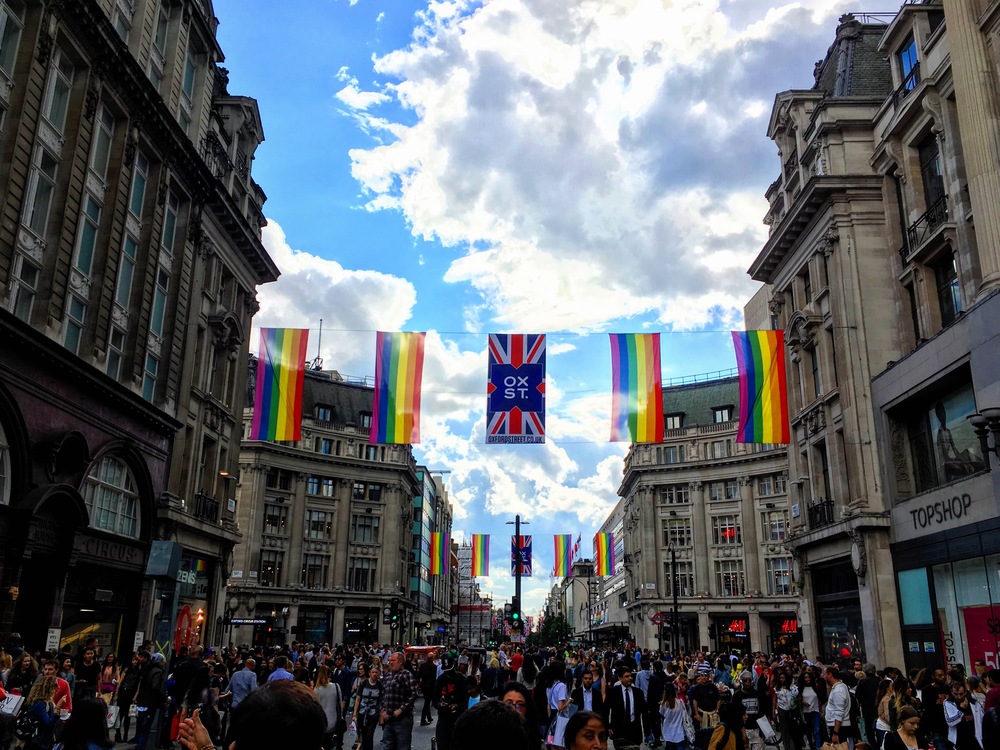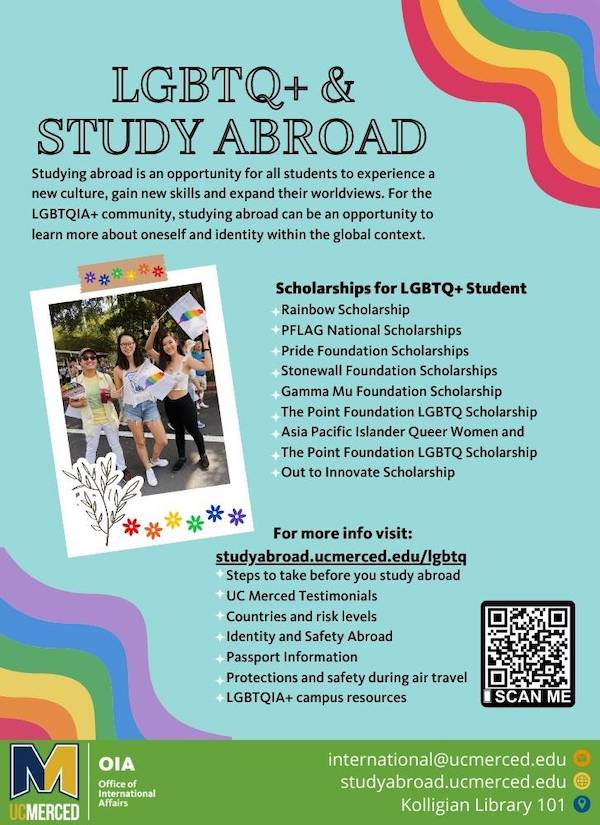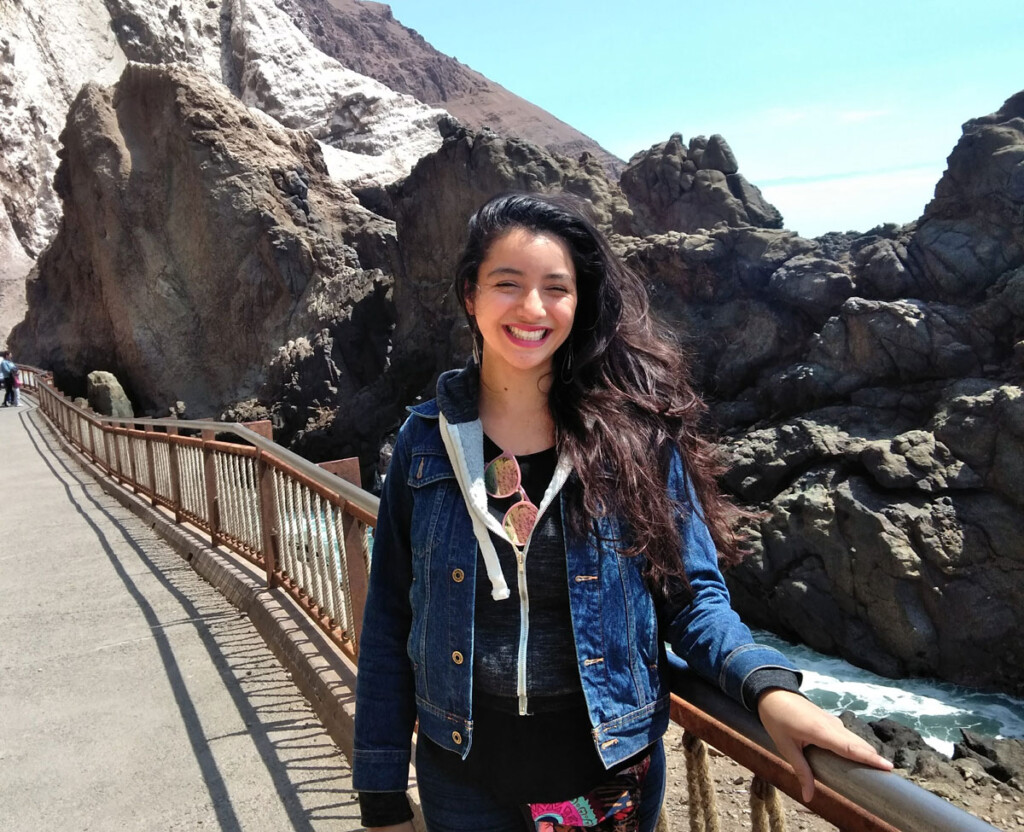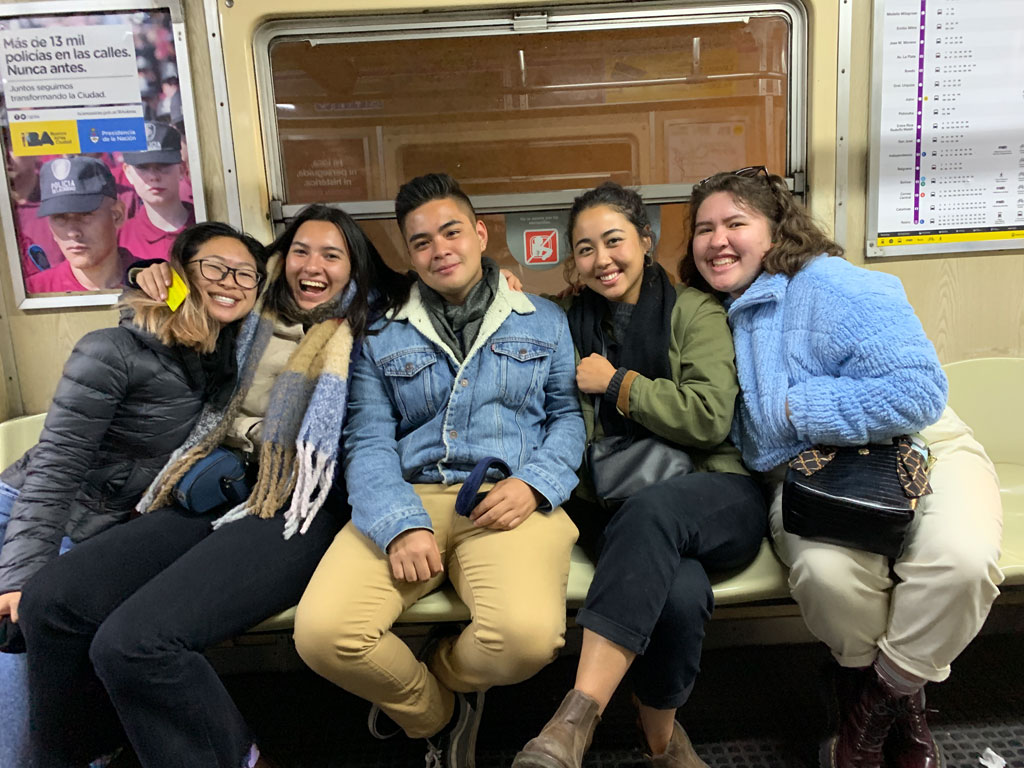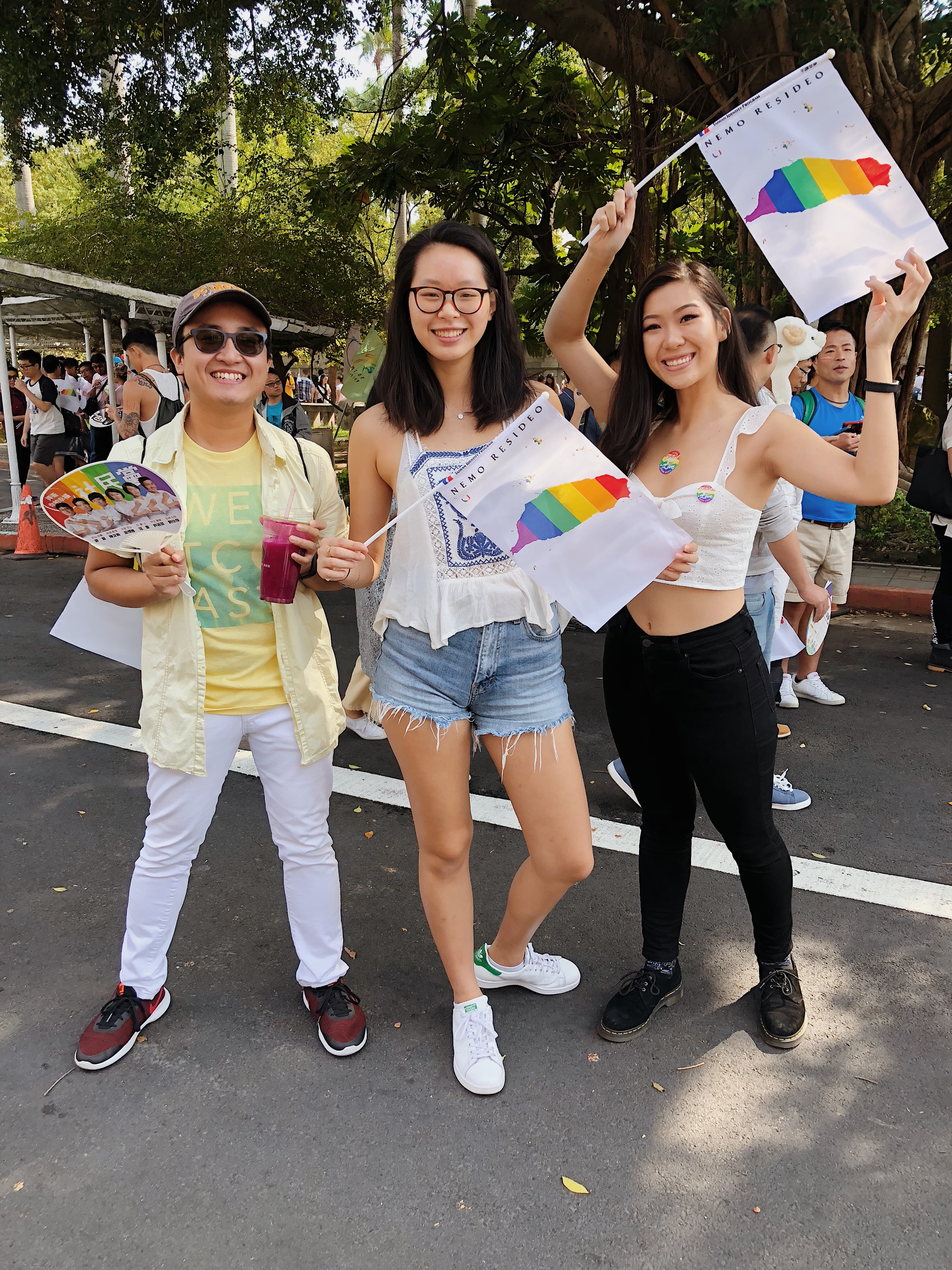
Studying abroad is an opportunity for all students to experience a new culture, gain new skills, and expand their world views. For the LGBTQ+ community, studying abroad can be an opportunity to learn more about themselves and their identity within the global context. The Office of International Affairs at UC Merced recognizes that the LGBTQ+ community faces a unique set of challenges and we are committed to providing our students with the best possible study abroad experience.
OIA LGBTQ+ Study Abroad Brochure
10 Reasons Why LGBTQ Students Should Study Abroad
Before You Apply to Study Abroad
Take the time to learn about:
- Laws of the host country
- LGBTQ+ media in host country
- LGBTQ+ organizations and support resources in host country
- General attitudes towards LGBTQ+ individuals in host country
- Norms and behaviors of the host culture
- LGBTQ+ meeting places in host country/city
Use the following resources to research your country of interest:
- LGBT Student Guide for Education Abroad
- iLGA: International Lesbian, Gay, Bisexual, Trans and Intersex Association
- iLGA World Database
- IGLTA: International Gay and Lesbian Travel Association
- Global Gayz
- IES Abroad Country-Specific resources
- Rainbow Sig
- IFSA Butler Identiy Resources and LGBTQ+ Student Stories
UC Merced Testimonials
UCEAP Countries and Tolerance Levels
UCEAP urges all participants to obey the laws of the host country, and respect and abide by local cultural norms. Before selecting a country, be well acquainted with host country laws and tolerance levels. Consider how a potential host country defines and views interpersonal relationships and what it views as appropriate behaviors.
2023 LGBTQ+ Study Abroad Destination Country Safety Scores
Below is a series of visualizations of common study abroad destinations for UC Merced students with Asher & Lyric's comprehensive “LGBTQ+ Travel Safety Index” country scores. Scores range from a high of 383 for Canada to -200 for Brunei (or -95 for Egypt when we consider only frequent study abroad destinations). Please note that local safety considerations vary widely beyond a single numerical national score.
World Map
Asia Close Up
Europe Close Up
UCEAP Countries by Risk Level
Minimal Risk Countries for Study Abroad
| Argentina |
| Belgium |
| Canada |
| Costa Rica |
| Czech Republic |
| Denmark |
| Germany |
| Ireland |
| Netherlands |
| New Zealand |
| Norway |
| Spain |
| Sweden |
| Switzerland |
| United Kingdom |
Low Risk Countries for Study Abroad
| Australia |
| Chile |
| France |
| Hungary |
| Israel |
| Italy |
| Japan |
| Mexico |
| Thailand |
| Taiwan |
Moderate Risk Countries for Study Abroad
| Brazil |
| China |
| Cyprus |
| Dominican Republic |
| India |
| Korea, Republic of |
| Singapore |
| Solomon Islands |
| South Africa |
| Taiwan |
| Turkey |
| Vietnam |
High Risk Countries for Study Abroad
| Barbados |
| Botswana |
| Egypt |
| Ghana |
| Indonesia |
| Jordan |
| Morocco |
| Russia |
| Senegal |
| Tanzania |
*Tolerance levels reflect information as of March, 2019.
Identity and Safety Abroad
Understanding the implications of expressing an LGBTQ+ identity abroad is important for all students to know. Although coming out may be an empowering experience, it can also be uncomfortable or even unsafe for students and those around them. Concepts of identity and the way in which LGBTQ+ individuals are perceived not only vary from country to country but even between regions within the same country. Researching your host country before going abroad will help mitigate risks. Though once abroad, it is recommended that students reevaluate the local LGBTQ+ tolerance levels before coming out. As part of the study abroad experience, students learn to adapt to their new environment by observing local manners and behaviors of their host culture. LGBTQ+ students should exercise the same caution.
Additional Resources
- Meaningful Travel Tips and Tales from GoAbroad.com
- Suggestions for LGBTQ Students Going Abroad
- Sexual and Gender Expression Abroad
- 5 Tips to Incorporate Your Identity Into the Study Abroad Experience
TIP: Once abroad, find people you can be open with and seek out local LGBTQ+ communities.
LGBTQ+ and Gender Studies Abroad
You can use the UCEAP Course Catalog to search for classes that focus on gender and sexuality (try searching UC Subject: Women and Gender Studies or Keyword: sex/sexuality, gender or queer). Past UC students have taken such courses in Argentina, Australia, Barbados, Denmark, France, Germany, Ghana, Hong Kong, Ireland, Japan, Mexico, Netherlands, New Zealand, Singapore, South Africa, Spain, Sweden, Thailand and the UK. However, please be aware that even though a program in a certain country may offer classes focusing on Gender or LGBTQ+ studies this does not necessarily reflect attitudes of the local community. Make sure you thoroughly research your program before making a choice.
International Opportunities Program (IOP) options:
Coming Soon!
Scholarships for LGBTQ+ Students
Travel Tips
Most LGBTQ+ travelers do not encounter problems while abroad but it helps being prepared and informed about your destination before you go. The following resources provide LGBTQ+ individuals with answers to frequently asked questions, tips on mitigating risk and other useful links.
Passport
For passport information concerning name changes, gender marker changes, and two-year passports visit the National Center for Transgender Equality.
Students that need a passport and are in the process or have completed gender transition should consult the U.S. Department of State for application information. To apply for a passport, students should use the DS-11 form and should be prepared to provide supporting documentation that includes:
- ID that resembles your current appearance.
- Passport photo that resembles your current appearance .
- A physician certificate that validates whether your gender transition is either in process or complete (required if you would like your passport issued in your new gender).
- Proof of legal name change (if applicable).
Air Travel
The National Center for Transgender Equality (NCTE) identifies the specific obstacles transgender people might face during air travel and how to get around them. NCTE also offers tips on how to get through TSA with resources like the notification card, which is a standardized card offered by TSA wherein one can discretely disclose a health or medically related circumstance to an agent, as well as requesting assistance from a Passenger Support Specialist during check in by calling TSA Cares 72 hours before checking in. For more information visit the TSA website for Transgender Passengers and Know Your Rights: Airport Security.
Check out IES Abroad's 12 tips for transgender and non-binary students in preparation for air travel.
Additional Resources
- GoAbroad.com LGBTQI Student Guide to Study Abroad
- DailyXtra
- Gay Pride Calendar
- OutRight Action International
- Out Traveler
Contact Us
International Affairs
Kolligian Library, Room 101
Monday - Thursday 9 a.m. to 4 p.m.
Friday - 9 a.m. to 2 p.m.
Phone: 209-228-4722
Email: international@ucmerced.edu
LGBTQ+ Pride Center
Office of Social Justice Initiatives & Identity Programs
Phone: 209-228-2250
Email: lgbtq@ucmerced.edu
Website: LGBTQ+ Pride Center
Lambda Alliance
Email: lambdaalliance@ucmerced.edu
Facebook: Lambda Alliance at UC Merced
**Material adapted from University of California, Santa Cruz, UC Education Abroad Program, Department of State, National Center for Transgender Equality, Rainbow SIG, and ILGA **
